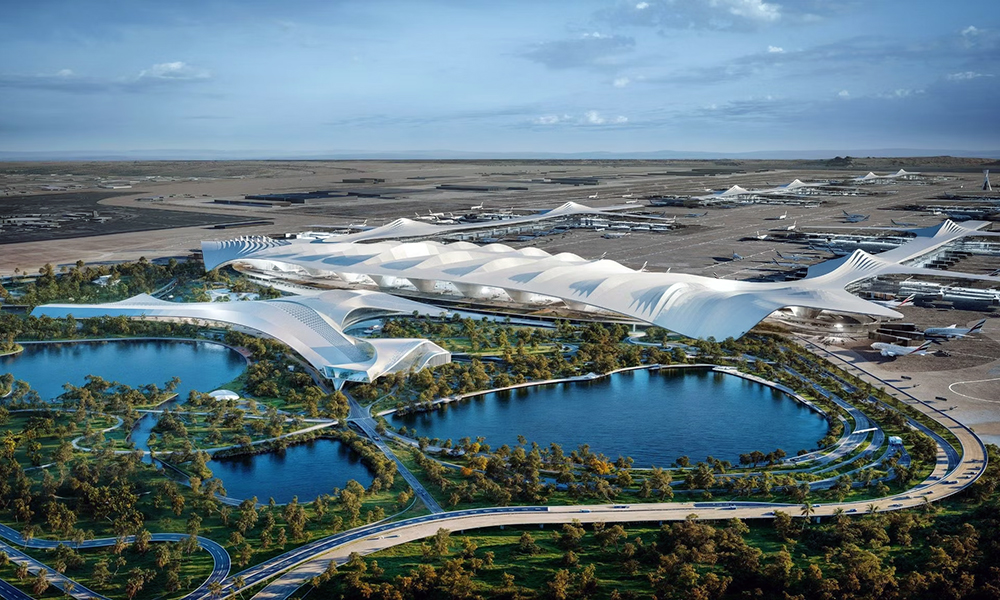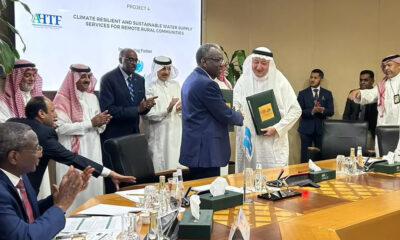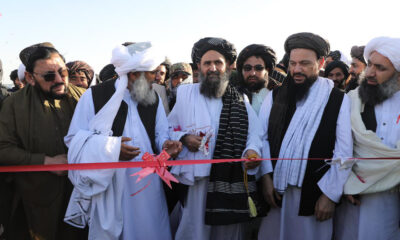Regional
New temple transforms India’s Ayodhya but Muslims feel neglected

In the northern Indian city of Ayodhya, which was once marred by communal tensions, labourers are finalizing a $6 billion infrastructure facelift ahead of the opening of a grand Hindu temple that is igniting an economic boom – which some of Ayodhya’s poor and its Muslim community say is passing them by, Reuters reported.
City officials expect about 4.5 million tourists a month – more than Ayodhya’s entire population of 3 million – once the first stage of Ram Mandir, as the temple is known, opens on Jan. 22 inside a sprawling complex of carved pink sandstone and white marble.
Ayodhya made international headlines in 1992 when a Hindu mob razed Babri mosque – where the Mandir will stand – saying it had been built on the site of an earlier Hindu temple. The incident sparked nationwide riots that left 2,000 people dead, most of them Muslims.
After decades of legal contests, India’s Supreme Court in 2019 awarded the site to Hindu groups for temple construction.
While the $180 million temple project in Uttar Pradesh state is funded by donations, the state government – controlled by Prime Minister Narendra Modi’s Hindu nationalist Bharatiya Janata Party (BJP) – is pulling out all the stops.
The BJP – which had made construction of the temple a national campaign pledge – is in government spending billions on rebuilding Ayodhya, with a new international airport, parks, roads and bridges in the offing.
Hindu priest Rajendra Das says the temple – which believers say is built on the birthplace of Lord Ram, one of Hinduism’s most sacred deities – has boosted Ayodhya’s hospitality and real estate sectors like never before.
“Everyone will benefit by the temple,” said Das, a 64-year-old dressed in a dhoti sarong. He is spending $120,000 to rebuild his tourist lodge – which is being demolished in the city’s revamp – with bigger rooms that have more amenities.
“Foreign tourists and people from every nook and corner of India will come.”
Reuters interviewed dozens of residents and businesspeople who said the Mandir is bringing a flood of new investment and prosperity to Ayodyha, though some complain of being left behind.
Locals whose property was demolished in redevelopment feel displaced by soaring land prices and scant compensation. And some from the city’s sizeable Muslim community of an estimated 350,000 said they are not reaping the benefits of the boom.
BJP spokesperson Rakesh Tripathi denied that Muslim residents were being left out: “If roads are getting widened then Muslims will also use them. If electricity supply is getting fixed, Muslims will also benefit.”
“This temple is expected to stand as one of the grandest Hindu temples, much like India’s own Vatican City,” said Lodha chief executive Samujjwal Ghosh, adding that businesses were marketing Ayodyha as a premium consumer product.
Each year, millions of Hindus travel to Indian temple cities like Varanasi and Tirupati, which have become tourist hotspots with thriving hospitality sectors.
The revamp, however, has upset many in the city’s Muslim community. In its 2019 order, the Supreme Court also said authorities must allocate the Uttar Pradesh Sunni Central Waqf Board, which advocates for Muslim rights, “suitable” land at a “prominent” place to build a new mosque.
The board was issued land 15 miles from the temple, just next to the city border. That effectively means Muslims are excluded from the development boom downtown, said Azam Qadri, president of Ayodhya district committee of the board.
When Reuters visited the site designated for the mosque, there was no construction or infrastructure development ongoing in the quiet surrounding area. A poster on a wall showcased the proposed design and read: “A Masterpiece In Making”.
“Everyone is focused on the temple. There should have been focus on promoting mosques too,” Qadri said.
Muslims still don’t have wide acceptance in the city and even if the community tried to build hotels, Hindu religious tourists might not visit, he added.
Regional
Dubai ruler approves new $35 billion airport terminal

Dubai’s ruler Sheikh Mohammed bin Rashid al-Maktoum approved a new passenger terminal in Al Maktoum International airport worth 128 billion AED ($34.85 billion), he said on Sunday in a post on X.
The Al Maktoum International Airport will be the largest in the world with a capacity of up to 260 million passengers, and five times the size of Dubai International Airport, he added, saying that all operations at Dubai airport would be transferred to Al Maktoum in the coming years, Reuters reported.
The Al Maktoum airport will also include 400 terminal gates and five runways, he said.
The airport will be the new home of flagship carrier Emirates and its sister low-cost airline Flydubai along with all airline partners connecting the world to and from Dubai, Dubai state-owned airline Emirates chairman Sheikh Ahmed bin Saeed al-Maktoum said.
The move “further solidifies Dubai’s position as a leading aviation hub on the world stage”, the CEO of Dubai Airports, Paul Griffiths, was quoted as saying by the Dubai Media Office.
Regional
Iraq criminalises same-sex relationships with maximum 15 years in prison

Iraq’s parliament passed a law criminalising same-sex relationships with a maximum 15-year prison sentence on Saturday, in a move it said aimed to uphold religious values but was condemned by rights advocates as the latest attack on the LGBT community in Iraq.
The law aims to “protect Iraqi society from moral depravity and the calls for homosexuality that have overtaken the world,” Reuters reported citing a copy of the law.
It was backed mainly by conservative Shi’ite Muslim parties who form the largest coalition in mainly Muslim Iraq’s parliament.
The Law on Combating Prostitution and Homosexuality bans same-sex relations with at least 10 years and a maximum of 15 years in prison, and mandates at least seven years in prison for anybody who promotes homosexuality or prostitution.
It also imposes between one and three years in prison for anyone who changes their “biological gender” or wilfully dresses in an effeminate manner.
The bill had initially included the death penalty for same-sex acts but was amended before being passed after strong opposition from the United States and European nations.
Until Saturday, Iraq didn’t explicitly criminalise gay sex, though loosely defined morality clauses in its penal code had been used to target LGBT people, and members of the community have also been killed by armed groups and individuals.
“The Iraqi parliament’s passage of the anti-LGBT law rubber-stamps Iraq’s appalling record of rights violations against LGBT people and is a serious blow to fundamental human rights,” Rasha Younes, deputy director of the LGBT rights programme at Human Rights Watch, told Reuters.
Iraqi officials who oversee human rights could not immediately be reached for comment.
Major Iraqi parties have in the past year stepped up criticism of LGBT rights, with rainbow flags frequently being burned in protests by both ruling and opposition conservative Shi’ite Muslim factions last year.
More than 60 countries criminalise gay sex, while same-sex sexual acts are legal in more than 130 countries, according to Our World in Data.
Regional
China to host Hamas, Fatah for Palestinian unity talks

China will host Palestinian unity talks between Hamas and its rivals Fatah, the two groups and a Beijing-based diplomat said on Friday, a notable Chinese foray into Palestinian diplomacy amid the war in the Gaza Strip.
Hamas, which controls Gaza, is the group whose fighters stormed into Israeli towns on Oct. 7, killing 1,200 people and capturing 253 hostages. Israel has sworn to annihilate Hamas in an onslaught that has killed more than 34,000 Palestinians.
Fatah is the movement of Mahmoud Abbas, president of the Western-backed Palestinian Authority, which exercises limited self-rule in the Israeli occupied West Bank.
The two rival Palestinian factions have failed to heal their political disputes since Hamas fighters expelled Fatah from Gaza in a short war in 2007. Washington is wary of moves to reconcile the two groups, as it supports the PA but has banned Hamas as terrorists.
A Fatah official told Reuters a delegation, led by the group’s senior official Azzam Al-Ahmed, had left for China. A Hamas official said the faction’s team for the talks, led by senior Hamas official Moussa Abu Marzouk, would be flying there later on Friday.
“We support strengthening the authority of the Palestinian National Authority, and support all Palestinian factions in achieving reconciliation and increasing solidarity through dialogue and consultation,” said Chinese Foreign Ministry spokesperson Wang Wenbin at a regular briefing on Friday, without confirming the meeting.
The visit will be the first time a Hamas delegation is publicly known to have gone to China since the start of the war in Gaza. A Chinese diplomat, Wang Kejian, met Hamas chief Ismail Haniyeh in Qatar last month, according to the Chinese foreign ministry.
The Beijing-based diplomat, who had been briefed on the matter, said the talks aimed to support efforts to reconcile the two Palestinian rival groups.
China has lately demonstrated growing diplomatic influence in the Middle East, where it enjoys strong ties with Arab nations and Iran. Last year, Beijing brokered a breakthrough peace deal between longstanding regional foes Saudi Arabia and Iran.
U.S. Secretary of State Antony Blinken said he discussed with Chinese President Xi Jinping and other officials in Beijing on Friday how China can play a constructive role in global crises, including the Middle East.
Chinese officials have ramped up advocacy for the Palestinians in international forums in recent months, calling for a larger-scale Israeli-Palestinian peace conference and a specific timetable to implement a two-state solution.
In February, Beijing urged the International Court of Justice (ICJ) to give its opinion on the Israeli occupation of the Palestinian Territories, which it said was illegal.
More recently, China has been pushing for Palestine to join the United Nations, which Beijing’s top diplomat Wang Yi said last week would “rectify a prolonged historical injustice”.
(Reuters)
-

 Latest News5 days ago
Latest News5 days agoOver 1,000 Afghan refugees forced out of Pakistan in one day
-

 Sport3 days ago
Sport3 days agoAfghanistan beat Iraq 5-3, inch closer to Futsal World Cup berth
-

 Regional3 days ago
Regional3 days agoNew UK sanctions target Iranian drone industry
-

 Regional4 days ago
Regional4 days agoTurkey accuses U.S. of double standards over Gaza in rights report
-

 Latest News3 days ago
Latest News3 days agoEU allocates 17 million euros to support Afghans on the move
-

 Latest News2 days ago
Latest News2 days agoPakistan extends registered Afghan refugees’ stay till June 30
-

 World4 days ago
World4 days agoUS student protests over Gaza intensify despite arrests
-

 Regional2 days ago
Regional2 days agoChina to host Hamas, Fatah for Palestinian unity talks
























